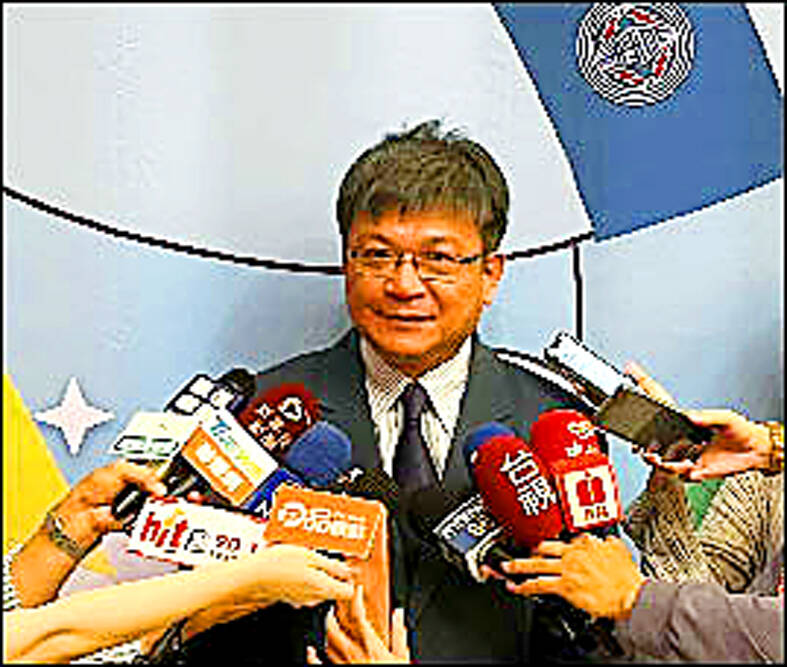Taiwan needs an efficient energy market if it is to reach net zero emissions by 2050, Taiwan Power Co (Taipower, 台電) chairman Tseng Wen-sheng (曾文生) said at a climate change summit on Wednesday.
The development of renewable energy requires new technologies and investment, “decisions about which are multifaceted,” Tseng said, adding that the government has many factors to consider, which can make decision-making slow and inefficient.
If renewable energy-related industries can develop according to market logic, decisions can be made more efficiently, “but it all comes down to [renewable energy] being able to be traded on an [efficient] energy market,” he said.

Photo: CNA
The Electricity Act (電業法) was amended in 2017, as a first step to liberalize the green energy market, allowing power generated by renewable energy facilities to be sold directly to consumers.
Major Taiwanese enterprises in need of large amounts of green electricity, such as members of RE100 — a global initiative calling for businesses to commit to 100 percent renewable electricity — have mostly opted to enter into corporate power purchase agreements (CPPA) that last up to 20 years with renewable energy generators such as offshore wind developers.
Renewable energy generators nevertheless have concerns about weaker buyers’ ability to stick to long-term contractual obligations and are thus less willing to sign CPPAs with them, a concern that has spurred the Ministry of Economic Affairs to introduce a government-backed renewable power credit guarantee scheme.
The scheme is to help mitigate the default risk of corporate consumers that would discourage renewable energy developers from signing agreements with them.
Twenty-year “one company, one generator” agreements can be “painful for any purchasing manager,” as it is possible green power would get cheaper in the future and there is no way to trade purchased green power in those 20 years, Tseng said.
He said an “intermediary mechanism” should be established to “equalize the risk of uncertainties” the company could experience in the years covered by the agreement.
The intermediate mechanism requires collaboration between two sides, Tseng said.
“One is on the supply side, such as the financial institutions, who can help re-mix different batches of energy products into a product that has a relatively stable price,” he said.
“The other is the demand side,” Tseng said. “As buyers might need different amounts of green electricity in different years, efficiency can only be achieved if they can transfer their purchased power to others freely.”
Only with such an energy market can a balance between supply and demand be achieved, Tseng said.
Tseng said he expects Taipower, as a renewable energy generator, to first work with major state-owned enterprises to stimulate the further development of the green energy market.

BYPASSING CHINA TARIFFS: In the first five months of this year, Foxconn sent US$4.4bn of iPhones to the US from India, compared with US$3.7bn in the whole of last year Nearly all the iPhones exported by Foxconn Technology Group (富士康科技集團) from India went to the US between March and last month, customs data showed, far above last year’s average of 50 percent and a clear sign of Apple Inc’s efforts to bypass high US tariffs imposed on China. The numbers, being reported by Reuters for the first time, show that Apple has realigned its India exports to almost exclusively serve the US market, when previously the devices were more widely distributed to nations including the Netherlands and the Czech Republic. During March to last month, Foxconn, known as Hon Hai Precision Industry

Taiwan Semiconductor Manufacturing Co (TSMC, 台積電) and the University of Tokyo (UTokyo) yesterday announced the launch of the TSMC-UTokyo Lab to promote advanced semiconductor research, education and talent development. The lab is TSMC’s first laboratory collaboration with a university outside Taiwan, the company said in a statement. The lab would leverage “the extensive knowledge, experience, and creativity” of both institutions, the company said. It is located in the Asano Section of UTokyo’s Hongo, Tokyo, campus and would be managed by UTokyo faculty, guided by directors from UTokyo and TSMC, the company said. TSMC began working with UTokyo in 2019, resulting in 21 research projects,

Taiwan’s property market is entering a freeze, with mortgage activity across the nation’s six largest cities plummeting in the first quarter, H&B Realty Co (住商不動產) said yesterday, citing mounting pressure on housing demand amid tighter lending rules and regulatory curbs. Mortgage applications in Taipei, New Taipei City, Taoyuan, Taichung, Tainan and Kaohsiung totaled 28,078 from January to March, a sharp 36.3 percent decline from 44,082 in the same period last year, the nation’s largest real-estate brokerage by franchise said, citing data from the Joint Credit Information Center (JCIC, 聯徵中心). “The simultaneous decline across all six cities reflects just how drastically the market

Ashton Hall’s morning routine involves dunking his head in iced Saratoga Spring Water. For the company that sells the bottled water — Hall’s brand of choice for drinking, brushing his teeth and submerging himself — that is fantastic news. “We’re so thankful to this incredible fitness influencer called Ashton Hall,” Saratoga owner Primo Brands Corp’s CEO Robbert Rietbroek said on an earnings call after Hall’s morning routine video went viral. “He really helped put our brand on the map.” Primo Brands, which was not affiliated with Hall when he made his video, is among the increasing number of companies benefiting from influencer